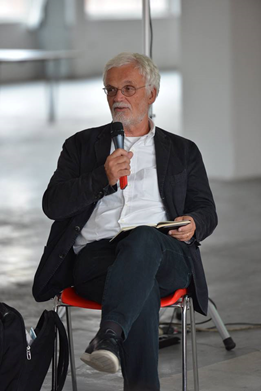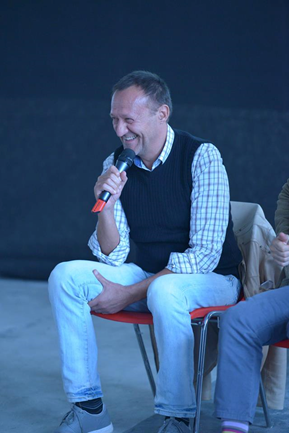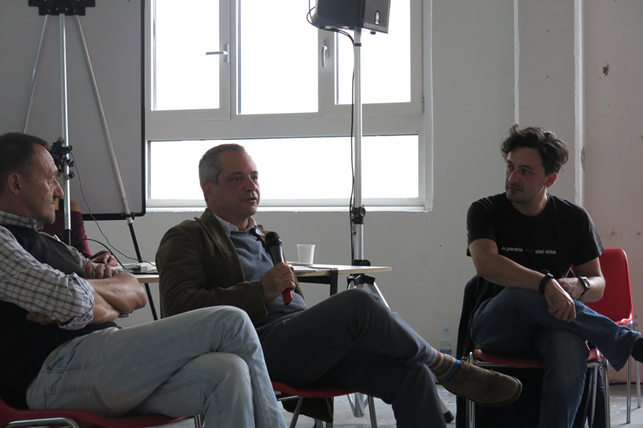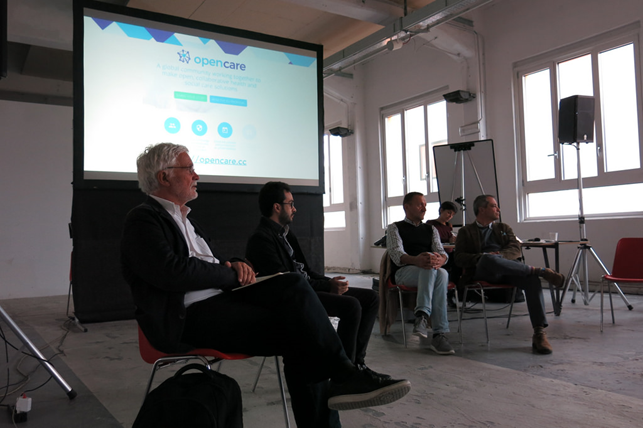This panel was part of Community of Change Festival organized by Rena (7/8/9 October). WeMake (Costantino Bongiorno) conducted the discussion. It was an occasion to reflect on Opencare, in particular on the pilot that we are conducting in Milan, and so the role of the makers’ approach in the system of Care.
Ezio Manzini

Open.
The fact that a service or a product is open means:
- A shared Language
- A rules system, simple, transparent, accessible
- Openness of processes (how I can realize something, distribute and then make it replicable)
- Openness of services (making access and usability possible)
Technologies and web make this possibility more concrete and real.
Care.
A broad meaning, that can include many and different things.
From asymmetric relations between patient and professional caregivers (Care home for elderly people for ex) to the idea of taking care of someone that is near us (relationships of neighborhood, family and community relationships…)
In this historical moment both kind of Care are in a big crisis. Professionalized Care: for questions of costs and demographic trends, Non-Professionalized Care: for the lack of communities and relations.
One crisis affects the other, reciprocally.
With the project Opencare we’re prototyping OPEN artefacts. But the question is: in which measure the artefacts are Open?
The method is engage the user. But it’s not enough! It’s not enough that there is the user in order to guarantee that the questions (that are driving our project/research) are right !!
Which are the Right Questions? The right questions are questions that can organize the open of care. The questions decide about the dimension of care.
However it’s really interesting what Wemake are doing: start to lead the makers culture in new territories, and not reduce them to product only gadgets !!
Key elements: the rights questions. How to facilitate the expression of right questions?. Facilitate processes helping the right questions coming to light.
Carlo Mango (Fondazione Cariplo)

Cariplo Foundation had a work plan about people wellbeing but with some problems to be implemented. So they decided to start CREW, (Co design, Rehabilitation, Wellbeing.)
Crew is a project for research and realization of technological solutions for Rehabilitation and Wellbeing of people with disabilities.
Main Areas:
- Neuromotor disorders of children
- Motoric practice and disability
- Scholastic integration and autism
- Spaces to develop a new autonomy
- Spaces to maintain autonomy for elderly people
The idea is to enhance a holistic approach to care and wellbeing, disrupting the traditional idea of care. We started also from the previous project RRI Tools that aims to promote the openness of research results and an ethical use of patents.
Crew deals with the issues of customizing products and services in order to answer to personal and particular problems. The method is participatory planning, using technologies that already exist.
Participants are different: from a manager of big companies to people that are part of associations of families of people with disabilities. The work is not driven from us, that are the donor, but is co-designed with all participants.
Not a simple project.
We have completed the phase of prototyping and now we are starting the developing and marketing phase. Before this phase we’re going to sign up an agreement among all participants, in the aim to preserve the ethical, innovative and participatory framework.
Crew works in an empty space, in a space of market failure (ex. non agonistic sport for disabled people or devices for growing children)
Crew deals with the big issue of intellectual property, how can we rule this theme with an ethic approach?
It is important to work with companies, developing a new way to do corporate social responsibility, for example starting to produce things for different needs, for ex. a company that produce sport products can start to produce modular and tailored products for people with disabilities, creating conditions to make sport accessible.
Renato Galliano (Municipality of Milan)

It is important the issue about the right questions that Manzini underlined.
Usually big companies pay market research to analyze the market questions, but in this way, we have the mainstream questions. Now there is need of products and services tailor-made and this is the direction of innovation.
Innovation processes take on board directly people that need something, the final users but also new actors, such as makers.
How can we go beyond the dwarfism of our projects? (Question posed by Costantino, referring to single little projects prototyped to respond to particular needs). In my opinion it is fundamental the capacity of hybridization. Hybridization always happens naturally in our market economy: big companies buy new startups. It is a well-known phenomenon!
Municipality of Milan would be an observatory and facilitator of these phenomena. How can we facilitate hybridization processes between startups and PMI or traditional big companies?
It is difficult to hybridize between different languages, for example third sector (ngos, cooperatives…) and innovators!
Manzini
Every project is about technology and society, from technology to society and vice-versa.
The openness is about the process? or is about the starting point? Or is about the technology proposed?
It’s important for WeMake to find emblematic cases where the maker-approach is the only possible solution. If we can reach this point, it becomes more simple to analyze the potentialities of a fablab, maybe as a part of an industrial system or a care system.
Some reflections on Opencare
OPENCARE can be a new way to deal with Care where Market, State, Society alone fail.
- When need is too specific and it is not possible to find accessible and concrete answers.
- When the social relations are too weak to do everything
- When public administration cannot really understand need and give a non-standardized answer
Openness into the Care processes: For PA Care OPEN could mean open the space of Care to other and new actors, facilitating the relations among them, evaluating their results and impacts.

